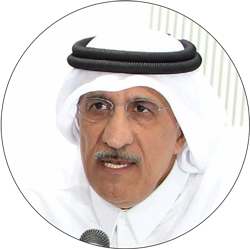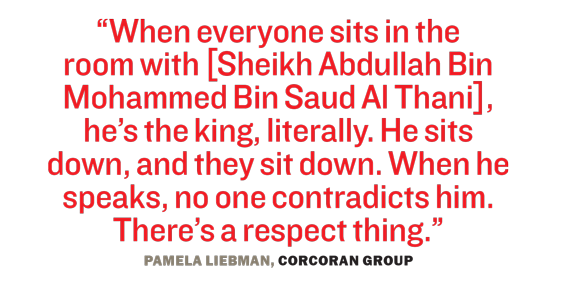Speaking at a conference hosted by Euromoney Magazine in Qatar in 2014, Sheikh Abdullah bin Mohammed bin Saud Al Thani called for a moment of silence.
“Silence at times may be golden,” he told the business executives at the event, which took place the month before he was named chief of Qatar’s notoriously secretive sovereign wealth fund. “But I assure you, ladies and gentlemen, that the noise we are making here in Qatar is already being heard around the world.”
Indeed, two years later, the Qatar Investment Authority has made more than enough noise in the New York real estate market to draw the industry’s attention.
While QIA spent years investing quietly in the U.S., through hedge funds and private equity funds, it has recently made more splashy purchases and increased its profile in the process.
In August, the sovereign wealth fund bought a nearly 10 percent interest in Empire State Realty Trust [TRDataCustom] (ESRT), the publicly traded real estate investment trust that owns the Empire State Building, as well as office and retail properties such as 111 West 33rd Street, 501 Seventh Avenue and 250 West 57th Street.
And the Empire State Building play was just the latest in the QIA’s aggressive push into New York.
Over the past two years, the fund has bought $3.78 billion worth of Manhattan properties, not including the ESRT investment, according to data firm Real Capital Analytics. That includes an undisclosed stake in Manhattan West, Brookfield Property Partners’ under-construction, $8.6 billion mixed-use project on the Far West Side. It also opened a Manhattan office last year.
Meanwhile, on the West Coast, QIA recently partnered with Santa Monica-based REIT Douglas Emmett on its $1.34 billion purchase of a California office portfolio from the Blackstone Group.

The chief of QIA, Sheikh Abdullah Bin Mohammed Bin Saud Al Thani
But despite these massive investments and its partnerships with some of real estate’s household names, QIA largely remains a mystery. And its business associates — perhaps reticent to anger the fund and lose out on investment dollars — have been very tight-lipped about how it operates.
In some ways, the fund has become even more private since it’s eaten losses recently on failed (non-real estate) investments in companies such as the commodity-trading and mining giant Glencore and German car manufacturer Volkswagen.
A 2014 survey of sovereign wealth funds by GeoEconomica, a political risk-management firm based in Switzerland, found QIA, which doesn’t publish annual reports or disclose how much money it manages, to be the least transparent of all sovereign funds.
“They used to be very talkative about what deals they did, but now they’re working under the radar,” said one of QIA’s Gulf-based advisers, who spoke only on the condition of anonymity, for fear of losing the fund’s business.
“They used to tell the whole world what they bought,” the adviser said. “Now, they realize nothing good can come of it.”
Lofty returns
While QIA’s operations may be an enigma, the source of its capital is not.
As the world’s biggest exporter of liquid natural gas, Qatar is one of the wealthiest countries on the planet. The riches can be seen on the skyline of the country’s capital city, Doha, which is dotted with luxury hotel and condo towers.
The QIA — created in 2005 by the country’s then Emir, or head of state, Sheikh Hamad bin Khalifa Al Thani, to manage oil and natural gas profits — reportedly controls upwards of $250 billion, though exact numbers are nearly impossible to come by.
Since Qatar has been run by the same family for more than 150 years, the QIA is essentially a family firm. Between 2008 and 2013, it was headed by Sheikh Hamad bin Jassim Al Thani, a member of the royal family known for his gregarious nature and flashy lifestyle. (According to the Financial Times, his name appeared in the Panama Papers in relation to an offshore entity designed to manage his $300 million yacht.)
Abdullah bin Mohammed — the chairman of telecommunications firm Ooredoo — was brought in after a brief stint by another chairman and is also a member of the royal family (he’s the half brother of the current emir). He is said to be more quiet and reflective than his predecessor.
But he has a big act to follow.
During the last financial crisis, the fund made big investments at steep discounts in a slew of trophy properties in Europe — including London’s famed Shard skyscraper and Harrods department store. Meanwhile, in Paris, QIA shelled out more than $600 million for a flagship retail property on the Champs-Élysées. It also bought stakes in banking behemoths Barclays and Credit Suisse.
“It’s really important to them to have assets on ‘Main and Main,’ very well located, no second- or third-tier assets,” said John Kim, an analyst at financial service firm BMO Capital Markets, who covers ESRT. “It’s stability and long-term upside.”
 QIA gained access to large deals in Europe through its close ties with global leaders such as former U.K. Prime Minister Tony Blair and former French President Nicolas Sarkozy, according to news reports and TRD sources.
QIA gained access to large deals in Europe through its close ties with global leaders such as former U.K. Prime Minister Tony Blair and former French President Nicolas Sarkozy, according to news reports and TRD sources.
Sarkozy and the Qataris were so close, in fact, that after Sarkozy left office, the emir reportedly tried to woo the politician to set up a Europe-based private equity fund that would be backed by Qatar. Sarkozy also reportedly came under scrutiny by football governing body FIFA while in office, after allegedly hosting a private meeting with the crown prince of Qatar and representatives of French soccer club Paris Saint-Germain F.C. during which they colluded to name Qatar the host city for the 2022 soccer World Cup. Sarkozy has denied the claims, and there have been no sanctions.
And Qatar’s tax treaties with France and other European countries allowed the country to limit its tax burden on its property purchases there.
But a handful of QIA’s largest investments have recently nosedived.
Last September, a Financial Times analysis estimated that the fund had posted a paper loss of more than $12 billion in the third quarter of 2015 alone, thanks to hits it took on investments in Volkswagen and Glencore. Some of those stocks have since rallied slightly.
In the wake of those losses, investments in real estate, where downsides tend to be more limited, may seem like a safer bet, sources said.
“They may be looking at taking a more conservative approach to investing,” said Michael Maduell, president of the Sovereign Wealth Fund Institute, a Las Vegas-based research group. “Investing in real estate is more of a vanilla investment than investing in a complex private company.”
The Land of Opportunity
Still, QIA has hundreds of billions to spend.
And with so much cash lining its coffers, it’s no wonder the fund made such a splash when it announced it would be opening an office in New York last year.
The fund quickly set up an office at one of the city’s most prestigious — and expensive — commercial addresses, Sheldon Solow’s 9 West 57th Street. Rents at the building reportedly top $100 a foot.
Finance titans such as Bill Ackman, Stephen Schwarzman and Larry Fink all reportedly attended a launch party for QIA’s New York operation.
To be sure, the fund has been investing here for some time.
It’s previously partnered with Boston Properties and Kuwait’s sovereign wealth fund to buy (and later sell) the GM Building. But having an on-the-ground operation signals that it’s increasing its commitment to investing in U.S. real estate.
The fund has made no secret of the fact that its redirecting its attention from Europe to the U.S. and Asia — and political forces such as Brexit may only have accelerated that process.
Pam Liebman, CEO of the Corcoran Group, told TRD that the brokerage has been advising QIA on some of its New York investments.
When she flew to Qatar recently for business, the QIA pulled out the red carpet, even taking Liebman on a gyrocopter in the desert.
“They couldn’t have been nicer to us,” said Liebman, who posted a photo of herself in front of the aircraft on Instagram. “There isn’t a developer or someone who needs money in New York who doesn’t go through those doors.”
As for working with Abdullah bin Mohammed, she said: “When everyone sits in the room with him, he’s the king, literally. He sits down, and they sit down. When he speaks, no one contradicts him. There’s a respect thing.”
The fund has also tapped some established names in finance to steer the ship amid the unraveling of some of its recent investments. For example, it recently hired Phil Dunne, the former CFO of Citigroup Alternative Investments, as its own CFO, Bloomberg News reported.
But while investing in New York real estate may be safer than some of QIA’s recent bets, sources said it hasn’t been easy. That’s partly because the U.S. government doesn’t hold as much clout when it comes to major investments in real estate as its European counterparts. And when major public-private partnerships such as Hudson Yards do arise, they’re usually awarded to U.S.-based firms.
“When you’re dealing with U.S. private equity funds, they are usually selling all the big deals to American funds or banks,” said the QIA’s adviser. “There are so many buyers in the U.S., they don’t care about the Arab market. Whatever deals the Arabs got were always secondary deals. They tried to compete with U.S. funds to try to get assets and couldn’t.”
That might explain why QIA has taken such pains to align itself with companies such as Brookfield and ESRT.
“I would imagine the big allure with ESRT was the Empire State Building, but it was interesting that they made an investment in the company and not the asset itself,” BMO’s Kim said. “Part of the reason [for that], I think, is that ESRT wouldn’t sell a stake in the Empire State Building.”
QIA’s advisor agreed: “Qatar couldn’t beat people like Brookfield to deals, so they bought a stake in them to get access to those deals,” he said. “Qatar is looking to set up vehicles alongside big players in the U.S.”
